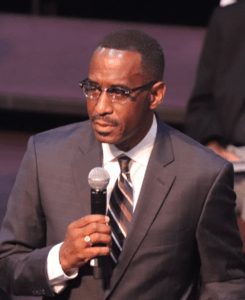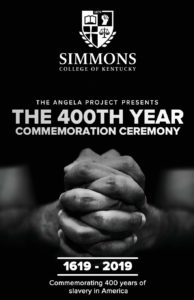Repairing America’s racial divide will require more than feeling remorse for sins in the past, the president of a historically black college in Louisville, Kentucky, told an audience of mixed races from various faith traditions gathered to reflect on the 400th anniversary of slavery in the United States.
“Why have we not gotten this thing right?” Simmons College President Kevin Cosby asked near the end of Tuesday’s Angela Project Liberation Ceremony at St. Stephen Baptist Church in West Louisville.

Kevin Cosby at Tuesday’s Angela Project Liberation Ceremony (Photo by Allen Hill via Facebook)
“We have not gotten it right because we don’t realize that with liberation, according to the Bible, always comes reparation,” said Cosby, who also serves as senior pastor of St. Stephen Baptist Church and as co-chair of Empower West, a coalition of black and white clergy committed to improving the quality of life in the poorest part of town.
“You can never separate liberation from reparations,” Cosby said, quoting Bible passages read during one of several liturgies of repentance and forgiveness read in turn by white and black members of the audience.
In Genesis 15, God tells Abram, in the words of the Revised Standard Version: “Know of a surety that your descendants will be sojourners in a land that is not theirs, and will be slaves there, and they will be oppressed for four hundred years. But I will bring judgment on the nation which they serve, and afterward they will come out with great possessions.”
In Exodus God says: “I know that the king of Egypt will not let you go unless compelled by a mighty hand. So I will stretch out my hand and smite Egypt with all the wonders which I will do in it; after that he will let you go.
“And I will give this people favor in the sight of the Egyptians, and when you go out, you shall not go out empty, but each woman shall ask of her neighbor, and of her who sojourns in her house, jewelry of silver and gold, and clothing, and you shall put them on your sons and on your daughters; thus you shall despoil the Egyptians.”
The ceremony, more than three years in the planning, is one of several observations around the country honoring Angela, a woman from Africa delivered into slavery on a ship that arrived near what is now Jamestown, Virginia, in August 1619.
“We have gathered on this occasion to commemorate the legacy of all those who were slaves for 246 years, and to help understand this monumental and incomprehensible crime against humanity,” Cosby said at the beginning of the service, led in turn by leaders of denominational groups including the Cooperative Baptist Fellowship and Baptist World Alliance.
“The reason we have to do this is because American history has either downplayed or denied the story of Angela and her descendants,” Cosby said. “We’re here to lift them up — not simply to rehearse history but to repair history.”
After a group of women wearing chains to evoke the image of kidnapped Africans bound together on slave ships took turns reading brief accounts of individuals who were enslaved, Frank Smith, executive vice president at Simmons College, observed: “Do they not sound like existence today in poor black America? Don’t we hear them echo from jail cells and broken homes?”
“As a people of God we are making a commitment that we are going to go from these chains to social change, until one day our people will be free,” said Smith, founding senior pastor at Christ’s Church for our Community.
 Joe Phelps, co-chair of Empower West and former pastor of Highland Baptist Church in Louisville, prayed a prayer asking for “a new start, a born-again experience” to “save us from the mess we are in.”
Joe Phelps, co-chair of Empower West and former pastor of Highland Baptist Church in Louisville, prayed a prayer asking for “a new start, a born-again experience” to “save us from the mess we are in.”
“We acknowledge healing will not fall from heaven because we gather for worship today,” said Phelps, currently justice director for the Passionist Earth & Spirit Center. “A new start will not appear in our collection plates because we prayed fervent prayers. It will happen when we become doers and not just hearers of the word.”
“As a baseline, may white Americans care for underprivileged black Americans as people as tangibly and as financially as we care for our purses and our positions and our property,” Phelps prayed. “Let every awakening white American financially support a black institution like Simmons dollar for dollar the same amount that we spend on our pets and on our pet projects.”
Cosby said the community event illustrates the importance of maintaining Historically Black Colleges and Universities, schools created or founded with the intention of serving the African-American community in the United States.
“The purpose of an HBCU is to keep in the forefront of America issues related to blacks, and we in Louisville are proud that we have one of the preeminent Historically Black Colleges and Universities, Simmons College of Kentucky,” he said.
“We have an HBCU in our community, and on this the 400th anniversary, we’re asking people to support it, so that kids across this country, and especially in West Louisville, will have a school they can go to,” Cosby said. “This is what this is all about: justice.”
Leaders of Empower West recently approached Southern Baptist Theological Seminary — which last year issued a report lamenting the institution’s historical ties to slavery — about sharing a portion of its endowment with Simmons College as an act of “repentance and repair” to the descendants of slaves. The seminary’s president and trustee chair declined, saying Simmons College operates outside the seminary’s control and does not share its conservative doctrine.
After Tuesday’s ceremony, clergy remained at the church for lunch to discuss plans for next steps described by Cosby as “Angela 2.0.”
“Before the nation split in 1861, every major denomination in America divided over the issue of slavery,” Cosby said. “Since we taught the nation how to divide over race, let us teach the nation how to come together as brothers and sisters.”
The 98-minute service — preceded by 40 days of prayer for “the liberation of American descendants of slavery” — used readings in a booklet written by Cheri Mills, church administrator at St. Stephen Baptist Church and founder of the 1 Voice Prayer Movement launched in 2009.
The liturgy included responsive readings where white people confessed and apologized for sins committed during the slavery era (1619-1865), Jim Crow (1877-1969) and the “aftereffects” era from 1970 until today. Blacks responded by forgiving and also repenting of hatred and unforgiveness for sins such as white flight and mass incarceration.
According to the worship booklet, there are more black men in U.S. prisons than the total number of persons incarcerated in nine countries combined. Those countries — India, Argentina, Canada, Lebanon, Japan, Germany, Finland, Israel and England — have a combined population of 1.7 billion people, five times that of the United States.
This story was edited for clarity after publication.
